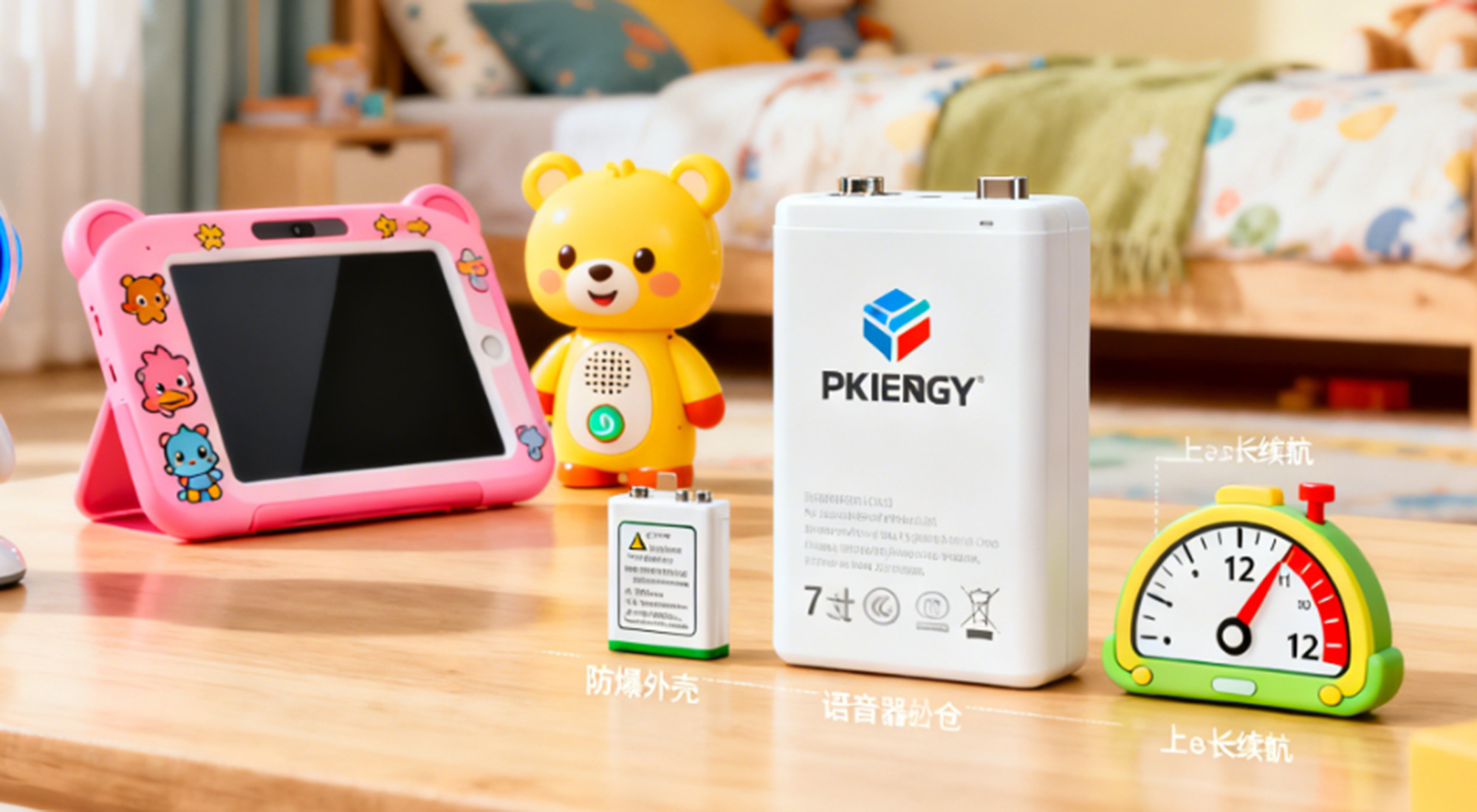Lithium Battery Solutions for AI Toys and Educational Devices
Custom Li-ion and LiFePO4 battery packs for AI robots, smart dolls, and STEM learning devices.
1. Industry Background
AI-powered toys and educational devices are rapidly becoming mainstream, offering interactive learning,
voice-assistant functions, motion sensing, and smart behavioral responses. The power system behind these products
must support high-performance processing while remaining safe, compact, and child-friendly. Lithium-ion batteries
have become the preferred energy solution due to their long runtime, lightweight form factor, and fast charging
capabilities. :contentReference[oaicite:0]{index=0}
From AI learning robots and smart dolls to AI-enhanced building kits and STEM educational devices, all of these
products rely on continuous, stable power to run sensors, microcontrollers, speakers, wireless modules, and
motorized mechanisms. A well-designed lithium battery pack directly improves user experience, product lifetime,
and safety performance.
As a custom battery manufacturer, PKNERGY focuses on
custom LiFePO4 battery
and
custom lithium polymer battery
packs for AI toys and educational electronics, helping brands build reliable and competitive products.
2. Technical Requirements for AI Toys Batteries
AI toys and learning devices typically integrate cameras, microphones, motion sensors, wireless modules (Wi-Fi,
Bluetooth), and small motors. This leads to strict requirements on the battery system:
- Safe chemistry – Li-ion or LiFePO4 chemistry is selected based on application, safety level, and space.
- Long runtime – Children expect AI toys to work for several hours of play or learning per day.
- High peak current capability – Motors and actuators cause short-term current spikes that the battery must handle safely.
- Compact size – The battery must fit into small, irregular toy housings without affecting appearance or ergonomics.
- Multi-level protection – Overcharge, over-discharge, over-current, and thermal protection are essential.
- Stable output voltage – Sensitive voice-recognition chips and wireless modules require a narrow voltage window for reliable performance.
Typical battery configurations in AI toys include:
- 1S Li-ion cells (3.7V) for compact voice-assistant toys, smart dolls, and tablets.
- 2S/3S packs for motor-driven robots or multi-axis motion platforms.
- Custom-shaped lithium-polymer packs designed to fill thin or irregular spaces, often used in
ultra-thin wearable-style devices
. - Integrated PCM/BMS for real-time protection, communication, and battery status monitoring.
3. Key Power System Pain Points
When AI toys or educational products enter mass production, engineers usually encounter the following challenges:
- Safety compliance for children’s products
Batteries must meet strict safety standards and pass drop, vibration, and abuse tests. Cell selection,
pack structure, and PCM design all affect safety. - Very limited internal space
Designers want thin and lightweight toys, but this limits cell size. Custom Li-polymer cells are often needed
to make full use of every millimeter of space. - Power spikes from motors
When motors start or change direction, instantaneous current can be several times the average load. The pack
must handle this without triggering protection unnecessarily. - Long standby and low self-discharge
Many toys are not used every day. A low self-discharge battery keeps sufficient energy even after weeks of
standby, reducing customer complaints.
By combining the right cell chemistry and a customized protection scheme, PKNERGY helps customers overcome these
typical design bottlenecks and improve both safety and runtime.
4. PKNERGY Lithium Battery Solutions
PKNERGY provides end-to-end battery solutions for AI toys and educational electronics, including cell selection,
pack design, certification support, and mass production. :contentReference[oaicite:1]{index=1}
4.1 High-quality cells
- High-performance cylindrical Li-ion cells (e.g. 18650, 21700) with stable cycle life.
- Thin and flexible pouch cells for ultra-compact or curved designs.
- Optional LiFePO4 battery customization for higher safety margin.
4.2 Custom pack design with PCM/BMS
PKNERGY’s engineering team designs battery packs according to the toy’s mechanical structure, working current,
and expected lifetime:
- 1S to 3S pack configurations with dedicated PCM.
- Battery shape and connector fully customized to your PCB and housing.
- Optional smart BMS with I2C/UART communication for advanced products.
4.3 Safety & materials
- Use of UL-grade insulation materials and reliable structural design.
- Cell and pack testing per UN38.3 and MSDS, IEC62133 optional on request.
- Support for third-party lab testing required for children’s products in different markets.
4.4 Fast charging & USB-C integration
For modern educational tablets and AI learning robots, PKNERGY can design packs compatible with fast charging and
USB-C power input. This improves user experience while keeping temperature and safety under strict control.
If you are developing a new AI toy project and need a reliable power partner,
you can also explore our
consumer electronics power solution
portfolio for more ideas.
5. Application Examples
PKNERGY’s custom lithium battery packs are widely used in:
- AI teaching robots for language learning, coding education, and interactive classroom activities.
- Smart learning tablets with AI-assisted teaching apps and handwriting recognition.
- Voice-assistant toys such as smart dolls and storytelling devices that respond to children’s voice commands.
- Motorized educational kits including AI-enhanced building blocks and STEM robotics kits.
For each project, we typically start from your mechanical drawings and power budget, then recommend a tailored
lithium battery pack—whether a
custom Li-ion polymer battery
or a custom LiFePO4 battery solution.
6. Battery Types & Pack Design Comparison
6.1 Li-ion vs LiFePO4 for AI Toys
| Item | Li-ion (NMC / NCA) | LiFePO4 |
|---|---|---|
| Nominal Voltage (1S) | 3.6–3.7 V | 3.2 V |
| Energy Density | Higher & more compact | Lower, slightly larger pack |
| Cycle Life | Good (typically 500–800 cycles) | Very long (1000+ cycles) |
| Safety Margin | High with good PCM/BMS | Very high & inherently stable |
| Typical Use in AI Toys | Thin tablets, compact toys | Higher-power robots, long-life devices |
6.2 Typical Custom Pack Features by PKNERGY
| Feature | Description | Benefit for AI Toys / Education Devices |
|---|---|---|
| Custom Shape & Size | Li-polymer or LiFePO4 cells shaped to fit your housing | Maximizes capacity without changing the product design |
| PCM / BMS Protection | Over-charge, over-discharge, short-circuit and temperature monitoring | Improves safety and reduces after-sales risk |
| Certified Materials | UL-grade insulation, robust wiring and structure | Supports compliance for children’s products in global markets |
| USB-C / Fast Charge Support | Customized charging solutions and protection design | Faster charging and more convenient user experience |
7. FAQs about Batteries for AI Toys & Educational Devices
Q1: How do I choose between Li-ion and LiFePO4 for my AI toy?
If your product is very compact and space is tight, Li-ion (NMC/NCA) with higher energy density is usually
preferred. If you need very long cycle life, extra safety margin, or your device draws higher currents, then
LiFePO4 may be a better choice. PKNERGY can evaluate your project details and recommend the most suitable
chemistry.
Q2: Can PKNERGY design a completely custom-shaped battery for a specific toy housing?
Yes. We specialize in custom lithium polymer battery
packs and can adjust length, width, thickness, and wiring to match your mechanical design, while keeping
safety and reliability as top priorities.
Q3: What certifications can PKNERGY support for children’s products?
Our packs are designed to meet UN38.3 and MSDS requirements, and we can support IEC62133 testing if needed.
For toys exported to Europe, North America or other regions, we can cooperate with your appointed laboratory
to complete the necessary tests for the whole device.
Q4: How can we start a new AI toy battery project with PKNERGY?
Simply share your product concept, estimated power consumption, desired runtime, and mechanical constraints.
Our engineers will propose 1–2 battery pack options, along with suggestions on charging, wiring, and
protection. You can also leave your request on our
Contact Us page.
Contact Zavier — PKNERGY
Ready to develop a custom lithium battery pack for your AI toys or educational devices? Get in touch with our battery expert Zavier for quick technical support and project quotation.
- Name: Zavier Wang
- Email: sale5@pknergy.com
- Tel / WhatsApp: +86 13823716492
Or send your project details via our online form: Get a Quote
Follow PKNERGY on social media for more case studies and battery insights: YouTube | LinkedIn | X | Facebook | TikTok


